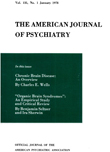An alternative view of the neurobiology of dreaming
Abstract
The author critiques the recently proposed activation-synthesis hypothesis about the origin and formation of dreams. Many findings do not support the new hypothesis that specific pontine physiological processes, rather than mental processes, instigate dreams and produce their distortion. First, dreaming often occurs in the absence of the pontine processes. Second, forebrain activity (which can have mental correlates) is crucial to the instigation and maintenance of dreaming sleep. Finally, activity of the proposed pontine dream generator, which is claimed to cause dream distortion, is not reliably accompanied by dream distortion.
Access content
To read the fulltext, please use one of the options below to sign in or purchase access.- Personal login
- Institutional Login
- Sign in via OpenAthens
- Register for access
-
Please login/register if you wish to pair your device and check access availability.
Not a subscriber?
PsychiatryOnline subscription options offer access to the DSM-5 library, books, journals, CME, and patient resources. This all-in-one virtual library provides psychiatrists and mental health professionals with key resources for diagnosis, treatment, research, and professional development.
Need more help? PsychiatryOnline Customer Service may be reached by emailing [email protected] or by calling 800-368-5777 (in the U.S.) or 703-907-7322 (outside the U.S.).



